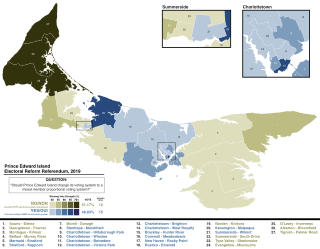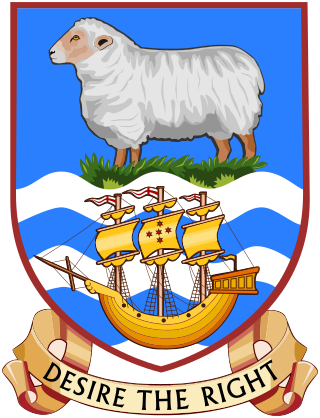
Referendums in the United Kingdom are occasionally held at a national, regional or local level. Historically, national referendums are rare due to the long-standing principle of parliamentary sovereignty. There is no constitutional requirement to hold a national referendum for any purpose or on any issue however the UK Parliament is free to legislate through an Act of Parliament for a referendum to be held on any question at any time.

The North East England devolution referendum was an all postal ballot referendum that took place on 4 November 2004 throughout North East England on whether or not to establish an elected assembly for the region. Devolution referendums in the regions of Northern England were initially proposed under provisions of the Regional Assemblies (Preparations) Act 2003. Initially, three referendums were planned, but only one took place. The votes concerned the question of devolving limited political powers from the UK Parliament to elected regional assemblies in North East England, North West England and Yorkshire and the Humber respectively. Each were initially planned to be held on 4 November 2004, but on 22 July 2004 the planned referendums in North West England and in Yorkshire and the Humber were postponed, due to concerns raised about the use of postal ballots, but the referendum in North East England was allowed to continue, particularly as it was assumed that the region held the most support for the proposed devolution.

A referendum was held in the Canadian province of British Columbia on May 17, 2005, to determine whether or not to adopt the recommendation of the Citizens' Assembly on Electoral Reform to replace the existing first-past-the-post electoral system (FPTP) with a single transferable vote system (BC-STV). It was held in conjunction with the BC Legislative Assembly election of 2005. Voters were given two ballots at that time: a ballot to vote for a Member of the Legislative Assembly of British Columbia (MLA) in their constituency and a referendum ballot. The referendum received considerable support from the electorate but failed in meeting the 60-percent threshold that had been set. A second referendum was held in 2009.
In Australia, referendums are public votes held on important issues where the electorate may approve or reject a certain proposal. In contemporary usage, polls conducted on non-constitutional issues are known as plebiscites, with the term referendum being reserved solely for votes on constitutional changes, which is legally required to make a change to the Constitution of Australia.

A referendum was held on October 10, 2007, on the question of whether to establish a mixed member proportional representation (MMP) system for elections to the Legislative Assembly of Ontario. The vote was strongly in favour of the existing plurality voting or first-past-the-post (FPTP) system.

Following the 2005 electoral reform referendum, British Columbia held a second referendum on electoral reform in conjunction with the provincial election on May 12, 2009. As in 2005, voters in 2009 were asked were asked which electoral system should be used to elect legislators: the existing first-past-the-post electoral system or the BC single transferable vote electoral system (BC-STV) proposed by the British Columbia Citizen's Assembly on Electoral Reform to ensure more proportional representation in the provincial Legislative Assembly.

The referendum on the law-making powers of the National Assembly for Wales was a referendum held in Wales on 3 March 2011 on whether the National Assembly for Wales should have full law-making powers in the twenty subject areas where it has jurisdiction. The referendum asked the question: ‘Do you want the Assembly now to be able to make laws on all matters in the 20 subject areas it has powers for?’
General elections were held in Jersey in two stages in October and November 2008.
The British Columbia Recall and Initiative Referendum was a referendum held in British Columbia on October 17, 1991. It was concurrent with that year's general election. The referendum posed two questions. They were on whether elected officials should be able to be recalled and whether voters should be given a citizen's initiative. Both questions were decisively approved with over 80% of the electorate voting yes to both questions.

A nationwide referendum was held in Moldova on 5 September 2010 on whether or not the country should amend the Constitution of Moldova to return to direct popular election of the president. Since 2001, the president had been indirectly elected by Parliament, with a supermajority of 61 seats required for election. The voters are asked to answer the following question: "Would you agree with the Constitutional amendment, which would allow the election of the President of the Republic of Moldova by the entire population?" Voters chose one of the proposed options: "Yes (for)" or "No (against)". Of those who had cast their vote, 87.83% chose "Yes". However, the referendum did not pass because only 30.29% of voters turned out, short of the necessary 33% for the referendum to be considered valid.

The United Kingdom Alternative Vote referendum, also known as the UK-wide referendum on the Parliamentary voting system was held on Thursday 5 May 2011 in the United Kingdom (UK) to choose the method of electing MPs at subsequent general elections. It occurred as a provision of the Conservative–Liberal Democrat coalition agreement drawn up in 2010 and also indirectly in the aftermath of the 2009 expenses scandal. It operated under the provisions of the Parliamentary Voting System and Constituencies Act 2011 and was the first national referendum to be held under provisions laid out in the Political Parties, Elections and Referendums Act 2000.

A fourteen-part referendum was held in Ecuador on 25 May 1997. Voters were asked whether they approved of the dismissal of President Abdalá Bucaram by the National Congress, the appointment of Fabián Alarcón as interim President for twelve months, the calling of a Constitutional Assembly, whether a Constitutional Assembly should be elected by direct elections or by appointment, whether spending limits should be introduced for election campaigns, whether voters should be able to modify electoral lists, whether National Assembly elections should be held alongside the first or second round of presidential elections, whether political parties that fail to cross the 5% threshold in two consecutive elections should be deregistered, whether the Supreme Electoral Tribunal (TSE) should reflect the political makeup of the National Congress, whether the National Congress should appoint managers of state-owned companies with a two-thirds majority, reforms to the justice system, allowing the Supreme Court to appoint judicial authority member, whether elected officials who commit a criminal offence should be removed from office, and whether the National Assembly should implement the 13 proposals. All eleven proposals were approved by voters.
A referendum on electoral reform was held on Jersey on 24 April 2013. Voters were offered three choices for a future electoral system, and will be asked to rank them in order of preference. Option B was the most preferred option, receiving 41% of votes in the first round, and 55% after second preferences were counted. Voter turnout was just 26%, and the proposed reforms were later rejected by the States.
A referendum is a direct vote in which an entire electorate is asked to either accept or reject a particular proposal. This article summarises referendum laws and practice in various countries.
An Icelandic Constitutional Council (Stjórnlagaráð) for the purpose of reviewing the Constitution of the Republic was appointed by a resolution of Althingi, the Icelandic parliament, on 24 March 2011. Elections were held to create a Constitutional Assembly (Stjórnlagaþing) body, but given some electoral flaws, had been ruled null and void by the Supreme Court of Iceland on 25 January 2011, leading the parliament to place most of the winning candidates into a Constitutional Council with similar mission. The question of whether the text of the proposed constitution should form a base for a future constitution was put to a non-binding referendum, where it won the approval of 67% of voters. However, the government's term finished before the reform bill could be passed, and following governments have not acted upon it.

A referendum to decide whether Greece should accept the bailout conditions in the country's government-debt crisis proposed jointly by the European Commission (EC), the International Monetary Fund (IMF) and the European Central Bank (ECB) on 25 June 2015 took place on 5 July 2015. The referendum was announced by Prime Minister Alexis Tsipras in the early morning of 27 June 2015 and ratified the following day by the Parliament and the President. It was the first referendum to be held since the republic referendum of 1974 and the only one in modern Greek history not to concern the form of government.

The Referendums Act 1997 is an Act of the Parliament of the United Kingdom, which made legal provision for the holding of two non-binding referendums in both Scotland on the establishment of a democratically elected Scottish Parliament with tax-varying powers and in Wales on the establishment of a democratically elected Welsh Assembly. In an unusual move the referendums bill was introduced to the House of Commons by the then Prime Minister Tony Blair himself on 15 May 1997 just two weeks after the landslide Labour victory in the 1997 General Election and was the very first Government sponsored Bill to be presented to the Commons by the Blair Government of 1997-2007. The Act received royal assent on 31 July 1997 and became Spent upon the conclusion of both referendums.

A referendum on electoral reform was held on April 23, 2019, in the Canadian province of Prince Edward Island – simultaneously with the 2019 provincial election – to determine if the province should adopt a mixed-member proportional representation voting system (MMP). A narrow majority voted to keep the existing first-past-the-post system. However, the referendum was not binding, as neither the yes or no side received majority support in 60% or more of the province's 27 electoral districts.

A referendum on reforming the electoral system was held in the Falkland Islands on 24 September 2020, after being postponed from 26 March 2020 following the Coronavirus pandemic. Voters were asked if they wanted to replace the two existing electoral constituencies with a single constituency for the whole of the Islands. Although a majority of those who voted supported the change, the required two-thirds majority in both of the islands' constituencies was not achieved.

Referendums in Jersey are presently provided for by the Referendums (Jersey) Law 2017. A lead campaign is limited to spending £2,800 for a particular referendum, and a further £0.11 for each person entitled to vote in that referendum. It is illegal to keep anonymous donations, which must be sent to the Treasurer of the States to be donated to charity.














